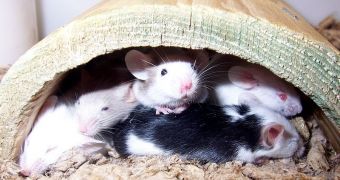A new scientific study has revealed that certain types of fears can be passed down through generations of mice. At this point, scientists have no idea as to how such data are inherited from mothers to offspring, but they say that it would be interesting to check and see whether or not a similar mechanism exists in humans as well.
Furthermore, it could be that anxiety and addition behaviors are transmitted from human mothers to their babies in just the same way. Not everyone is convinced that the new study is accurate, though. Some experts say that a biological basis for the proposed mechanism has yet to be identified.
Our current understanding of genetics suggests that only sequences of material inscribed in DNA can transmit information from one generation to another. What this provocative study of mice indicates is that another pathway for data transmission may exist, of which researchers knew nothing until now.
Additionally, DNA mutations that occur randomly at all times cannot explain how fear is passed down in mice, since it is widely accepted that these changes are adopted in a species over many generations.
One possible explanation for what the team discovered is that the behavioral modifications seen in mice are epigenetic in nature, meaning that they stem from alternations in gene expression patterns, not changes occurring into the structure of the genes themselves.
“There are a lot of anecdotes to suggest that there’s intergenerational transfer of risk, and that it’s hard to break that cycle,” says Emory University neurobiologist and psychiatrist, Kerry Ressler. The expert was the coauthor of a new paper detailing the findings, which was published in the December 1 issue of the top scientific journal Nature Neuroscience.
In the experiments Ressler and colleague Brian Dias performed, mice were trained to associate the smell of acetophenone with small electric shock. Eventually, the rodents began to fear the smell itself, even in the absence of said shocks. This behavior was passed down to the next generation.
When the offspring were exposed to the smell of acetophenone, even though they were themselves never zapped, they began to shudder just like their parents. Their response was significantly more intense than that exhibited by offspring of mice that were not conditioned to fear the smell.
The skepticism related to the very existence of this mechanism will endure “until someone can really explain it in a molecular way. Unfortunately, it’s probably going to be complicated and it’s probably going to take a while,” Ressler concludes, quoted by Nature.

 14 DAY TRIAL //
14 DAY TRIAL //